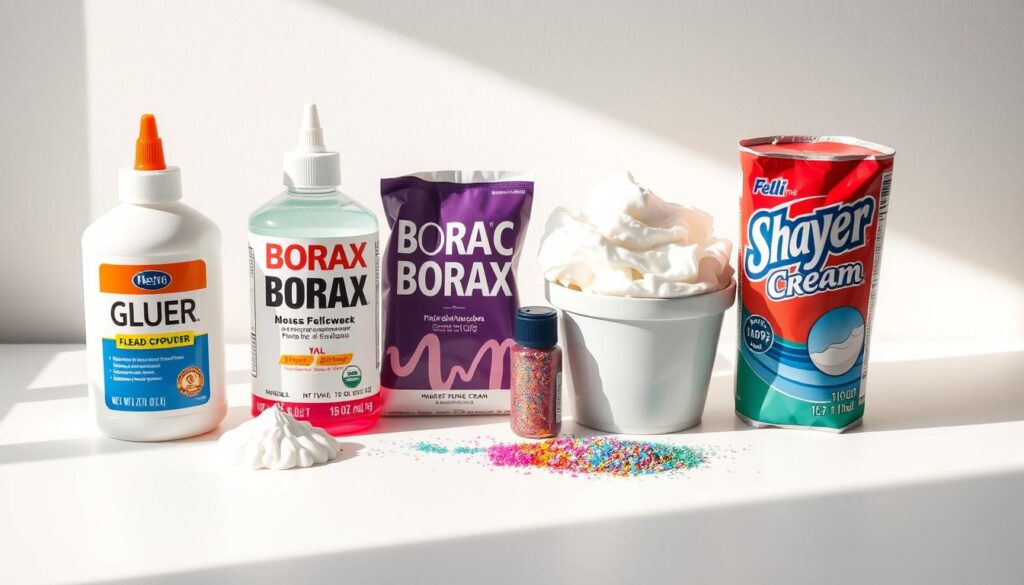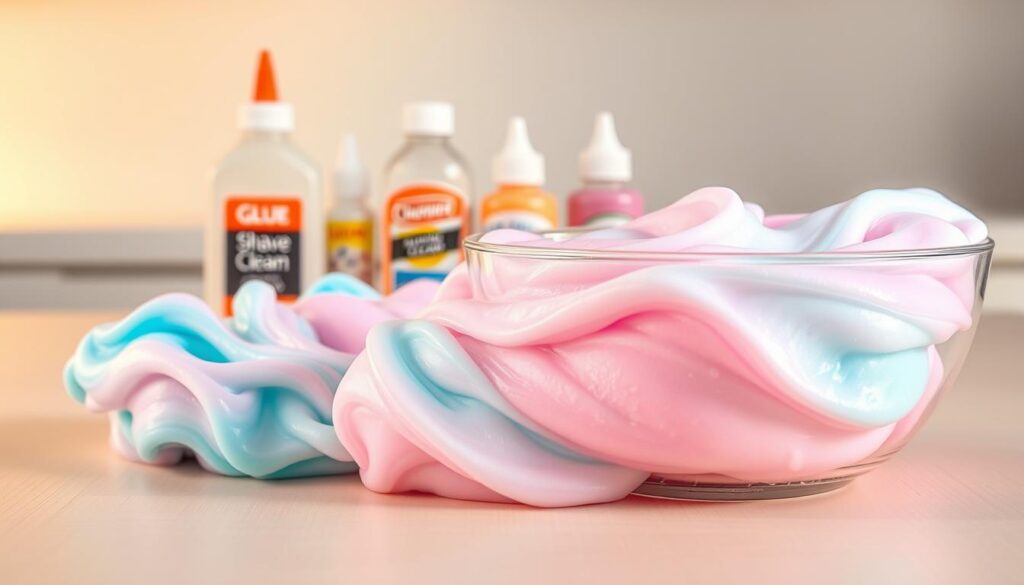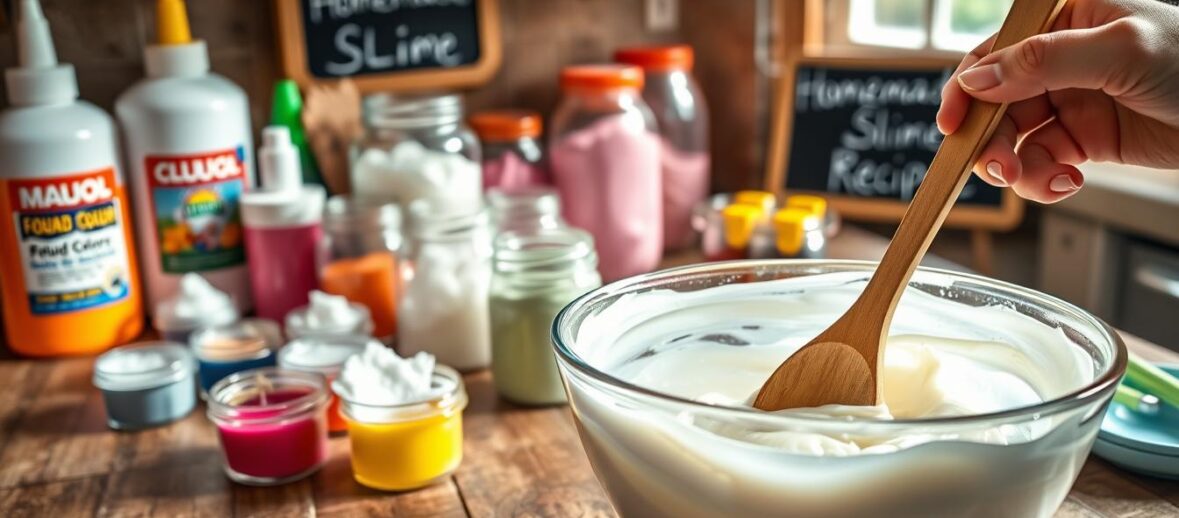Welcome to the world of slime making, a fun and creative activity for everyone! You can make your own homemade slime recipe with simple ingredients. It’s a great way to have fun with family and friends.
There are many recipes to try, letting you experiment with different textures and colors. This makes each slime unique. Safety is important, and with a few tips, you can have a fun and safe time. Whether you’re new to slime making or experienced, it’s a great way to show your creativity.
Key Takeaways
- Simple ingredients for a fun and creative activity
- Various slime recipes to try at home
- Safety tips for a fun and safe experience
- A great way to spend quality time with family and friends
- Endless possibilities for creative expression
The Magic of Homemade Slime
Making slime at home is truly special. You get to mix and mold a fun, squishy texture that’s yours. It’s not just fun; it’s a great way to bond with your family.
Why Slime Has Become a Popular Craft
Slime has become a favorite in many homes. Its appeal lies in its versatility and creative freedom. You can make each batch unique by adding different colors, textures, and scents.
Benefits of Making Slime with Your Family
Making slime together is a great way to bond and make memories. It helps with teamwork, creativity, and fine motor skills in kids. Plus, it’s a fun way to learn about textures and colors.
What You’ll Need to Get Started
To begin making slime, you’ll need a few basic ingredients. Here’s a quick rundown:
| Ingredient | Purpose | Alternatives |
|---|---|---|
| Glue | Base ingredient | White or clear glue |
| Borax | Slime activator | Contact lens solution, liquid starch |
| Water | Thins out the glue | Saline solution |
| Food coloring | Adds color | Various colors available |
With these ingredients, you’re all set to start making slime. Try different ratios and add-ins to find your perfect slime.
Essential Ingredients for How to Make Slime
To start making slime, you need some key ingredients. Luckily, you might already have these at home or can find them easily.
Basic Slime Components Explained
Most slime recipes need glue, water, and a slime activator. Glue gives the slime its texture. The activator makes it the right consistency. You can choose between white or clear glue, depending on your slime type.
Understanding Slime Activators
Slime activators turn your glue mix into slime. Common ones are borax, liquid starch, and contact lens solution. Borax is popular, but some prefer other options for skin reasons.
Budget-Friendly Alternatives
Looking to save money? There are cheaper options. For example, use saline solution instead of contact lens solution in some recipes. Here are budget tips for slime making:
- Use glue sticks you already have at home.
- Choose store-brand or generic slime ingredients.
- Shop during sales or use coupons.
Where to Find Ingredients for Under $10
You can find slime ingredients at dollar stores, grocery stores, or online. Making a basic slime can cost under $5 if you have some ingredients already. Here’s a cost breakdown:
| Ingredient | Average Cost |
|---|---|
| Glue | $1-$2 |
| Borax or Alternative Activator | $1-$3 |
| Food Coloring (optional) | $0.50-$1 |
Choosing wisely can help you make slime without spending a lot.
Safety First: Creating Non-Toxic Slime
When making slime, safety is key. It’s important to make sure the ingredients and process are safe for everyone. This is especially true when kids are involved.
Understanding Ingredient Safety
Not all slime ingredients are safe. Glue and water are usually okay, but borax can be dangerous if not used right. Knowing what each ingredient does is vital for a safe slime-making time.
Child-Safe Alternatives to Borax
Borax is a common slime activator, but it can hurt skin and is bad if swallowed. Luckily, there are safer options like liquid starch or contact lens solution. These alternatives make slime fun and safe for kids.

Allergy Considerations
Some people might be allergic to slime ingredients. For example, latex allergy can be a problem with certain glues. Choosing hypoallergenic ingredients helps everyone enjoy slime without worries.
Proper Handling and Clean-up Tips
To keep slime making safe and fun, handle ingredients and slime right. Wash your hands after touching slime and clean spills fast. This keeps everyone safe and your space clean.
Classic Slime Recipe: Step-by-Step Guide
Ready to make slime? Our guide will show you how to make classic slime. It’s a favorite among kids and adults. You can make it at home with simple ingredients and patience.
Complete Ingredients List
To make classic slime, you need these ingredients:
- 1 cup of Elmer’s White Glue
- 1/2 cup of warm water
- 1 teaspoon of borax
- Food coloring (optional)
- Glitter or other decorations (optional)
Detailed Mixing Instructions
Preparing Your Workspace
First, cover your workspace with newspaper or a plastic tablecloth. Wear old clothes or an apron to avoid stains.
Activator Preparation
In a small bowl, mix 1/2 cup of warm water with 1 teaspoon of borax. Stir until the borax dissolves. This solution is key for slime’s texture.
Combining Components
In a large bowl, mix 1 cup of Elmer’s White Glue with 1/2 cup of warm water. Add food coloring if you want to color your slime. Mix until the glue and water are well combined.
Kneading Techniques
Slowly add the borax solution to the glue mixture, stirring constantly. You’ll see the slime form. Knead the slime until it’s the right consistency.
| Step | Action | Result |
|---|---|---|
| 1 | Mix glue and water | Uniform liquid mixture |
| 2 | Add borax solution | Slime starts to form |
| 3 | Knead the slime | Desired consistency achieved |
Troubleshooting Common Issues
If your slime is too sticky, add more borax solution. If it’s too dry, add warm water. Adjusting the ratios can help you get the perfect slime.
How to Make Fluffy Slime: The Ultimate Tutorial
Ready to explore fluffy slime, a fun and squishy treat for everyone? It’s a twist on the classic slime, with shaving cream adding a cloud-like texture.

Special Ingredients for Cloud-Like Texture
To craft fluffy slime, you need special ingredients. Shaving cream is key for its unique texture. You’ll also need white glue, saline solution or borax, and water. You can add food coloring and glitter for extra fun.
Detailed Step-by-Step Instructions
Mixing the Fluffy Base
Begin by mixing 1/2 cup of white glue with 1/2 cup of shaving cream in a bowl. Stir until it’s smooth. If you want color, add a few drops of food coloring now.
Adding the Perfect Amount of Activator
In another bowl, mix 1 tablespoon of borax with 1 cup of warm water. Stir until the borax dissolves. Slowly add this activator to the glue mixture, stirring constantly. You’ll see the slime thicken.
Incorporating Shaving Cream
Keep stirring until the slime is fluffy and smooth. If it’s too sticky, add more activator. If it’s too dry, add more shaving cream.
Tips for Perfect Fluffy Consistency
For the perfect fluffy slime, adjust the glue to shaving cream ratio and activator amount. Experiment to find your favorite texture. Here are some tips:
- Choose high-quality shaving cream for fluffiness.
- Add activator slowly to avoid stiffness.
- For stickiness, add more borax solution.
- Try different colors and add-ins like glitter or sequins.
Troubleshooting Fluffy Slime Problems
Even with the best efforts, fluffy slime might not always turn out right. Here are common issues and solutions:
- Too Sticky: Add more borax solution.
- Too Dry: Add more shaving cream.
- Not Fluffy Enough: Adjust your glue to shaving cream ratio.
With these tips and practice, you’ll master fluffy slime. Enjoy making your own colorful slime ideas with different colors and textures.
Budget-Friendly Slime Variations
Creating slime doesn’t have to be expensive. Here are some cost-effective ideas to get you started. Making slime on a budget is all about being creative with the ingredients you have on hand.
Dollar Store Slime Recipe
One of the most affordable ways to make slime is by using ingredients from the dollar store. You can find glue, activators, and other necessary supplies for under a dollar. Here’s a simple recipe:
- 1 cup of white glue
- 1/2 cup of warm water
- 1 teaspoon of borax
- Food coloring (optional)
Mix the glue and water, then add borax slowly until you achieve the desired consistency. This recipe is not only budget-friendly but also easy to make.
Pantry Ingredients Slime
You can also make slime using common pantry ingredients. For example, a mixture of cornstarch and dish soap can create a fun, tactile slime.
“Using pantry staples can be a great way to make slime without buying special ingredients.”
Here’s a simple recipe to try:
- 2 cups of cornstarch
- 1 cup of dish soap
- Food coloring (optional)
No-Glue Slime Options
For those looking for glue-free alternatives, there are several options available. One popular method is using shampoo and salt.
Mix equal parts of shampoo and salt, then knead until you achieve the desired slime texture. This method is great for those with glue allergies or sensitivities.
Cornstarch and Dish Soap Slime
This slime recipe is another budget-friendly option that uses common household ingredients.
To make it, mix 2 cups of cornstarch with 1 cup of dish soap. Add food coloring if desired, and knead until you achieve the right consistency.
Cost Comparison of Different Recipes
Let’s compare the costs of different slime recipes:
| Recipe | Cost |
|---|---|
| Dollar Store Slime | $1.50 |
| Pantry Ingredients Slime | $0.50 |
| No-Glue Slime | $1.00 |
| Cornstarch and Dish Soap Slime | $0.75 |
As you can see, making slime can be very budget-friendly, with some recipes costing less than $1.
Adding Colors and Textures to Your Slime
Turning your slime into a colorful, personal masterpiece is simple. You can pick from many coloring options and add-ins. This lets you make slime that shows off your unique style.
Safe Coloring Options
Coloring your slime safely is key. Food coloring and liquid watercolors are good choices because they’re safe and easy to find. For brighter colors, acrylic paint works well, but use it carefully to avoid changing the slime’s feel.
Fun Add-Ins and Mix-Ins
Adding textures and elements can make your slime more fun. Here are some cool ideas:
- Glitter and Sparkle Effects: Add glitter on top or mix it in for extra sparkle.
- Beads and Foam Additions: Beads or foam particles add a fun, crunchy feel.
- Scented Slime Ideas: Use scented oils or extracts for a nice smell.
Glitter and Sparkle Effects
Glitter can be added on top or mixed in. For a stronger sparkle, try layering different glitters.
Beads and Foam Additions
Beads and foam add texture and a fun touch. Try different sizes and shapes for cool effects.
Scented Slime Ideas
Scented slime is great, especially for kids. Use essential oils or fragrance oils that are safe for skin.
Creating Multi-Colored Slime
To make multi-colored slime, mix colors together or create marbled effects. Trying out different colors can lead to amazing results.
Themed Slime Projects
Themed slime projects are a fun way to enjoy slime. You can make holiday-themed slime or character-inspired slime. Your imagination is the only limit.
Storing Your Homemade Slime Properly
Keeping your homemade slime fresh is all about proper storage. When stored right, slime stays soft and fun for weeks. Here are some tips to keep your slime in top shape.
Best Container Options
The right container is crucial for slime’s texture. Think about using:
- Air-tight plastic containers
- Glass jars with tight-fitting lids
- Zip-lock bags
These options keep air out, helping your slime stay fresh.
Extending Slime Shelf Life
To extend your slime’s life, store it in a cool, dry spot. Avoid direct sunlight. You can also:
- Knead your slime regularly to keep it soft
- Add a few drops of water if it starts to dry out
- Keep it away from heat sources
Signs Your Slime Has Gone Bad
If your slime smells bad, gets too sticky or dry, or grows mold, it’s time for a new batch. Regular slime checks can catch problems early.
Fun Slime Activities for the Whole Family
Slime is more than just a toy; it opens up a world of fun for everyone. You can make slime games, experiments, and creative projects. This turns slime into a fun experience for the whole family.
Slime Games and Challenges
Make slime games by setting up slime-making challenges or obstacle courses. You can also create a slime “escape room.” Kids have to solve a slime-covered puzzle to get out.
- Slime tug-of-war
- Slime sculpture contest
- Slime sensory bin activities
Educational Slime Experiments
Slime is great for learning. It teaches kids about polymers, viscosity, and chemical reactions. Try making slime with different ingredients to see how they change it.
Seasonal Slime Themes
Make slime that fits the season or holiday. For Halloween, make orange and black slime. For St. Patrick’s Day, make green slime. This makes slime activities even more fun.
Slime Birthday Party Ideas
Slime can be the main attraction at your child’s birthday party. Set up slime stations for kids to make their own slime. You can also have slime-themed cake and decorations.
“The best way to get started is to quit talking and begin doing.” – Walt Disney
Documenting Your Slime Adventures
Keep a record of your slime creations on social media or in a slime journal. This lets you see how your slime changes over time. It’s also a great way to share your fun with others.
By adding these fun slime activities to your daily routine, you’ll make lasting memories. And you’ll have a great time doing it.
Conclusion: Endless Possibilities with DIY Slime
Now you know how to make slime, and you’re ready to get creative. You’ve learned about classic slime and fun, fluffy, and budget-friendly recipes. You can now make slime that’s just right for you and your family.
As you try out different ingredients and textures, you’ll find even more ways to enjoy slime making. It’s a great activity for kids or a fun way for you to express yourself. Making slime at home is full of endless possibilities.
You now have the skills to create your own slime recipes and share them with others. So, let your creativity shine, have fun, and enjoy making slime. It’s a rewarding experience that brings joy to everyone involved.

